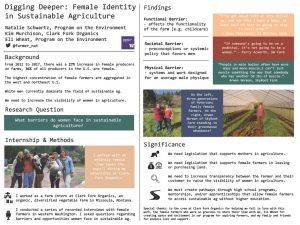Digging Deeper: Female Identity in Sustainable Agriculture
During my internship at Clark Fork Organics, an entirely female powered farm, I was inspired by the ability of women to defy societal standards of work that are typically dominated by men. Leaders in our food system, and particularly on farms, are predominately white males. Female farm producers increased by 23% from 2012 to 2017 according to the U.S. Census of Agriculture. The aim of my research was to understand how women’s work in sustainable agriculture is influenced by their identity and how the barriers and opportunities they face affect their work. Throughout my capstone, I first interned at Clark Fork Organics, an eight acre, organic, diversified vegetable farm in Missoula, Montana. I learned the complexities of operating a small scale farm from my female farm manager. Second, I conducted a series of interviews with women in sustainable agriculture across the Pacific Northwest. I learned that women in sustainable agriculture find barriers in their work through societal, functional, and political gendered standards. Numbers of women in the field of agriculture are increasing, so we must continue to make farmers more transparent to their consumers, work to change policy that will better support women, and create pathways for women to start careers in the field.
